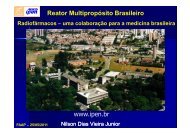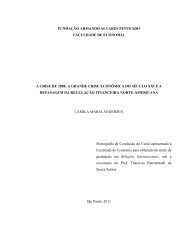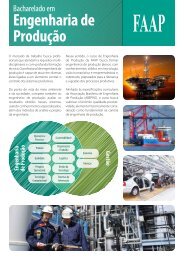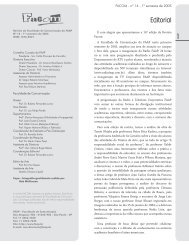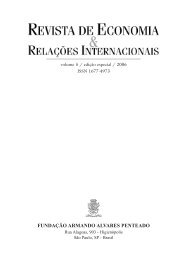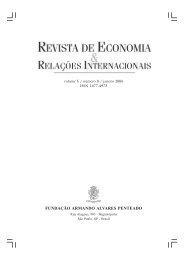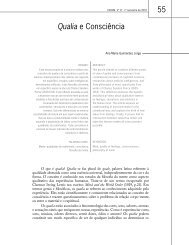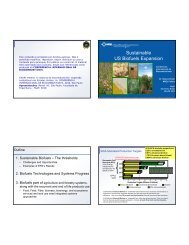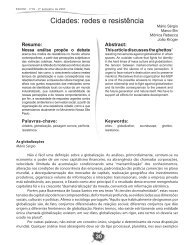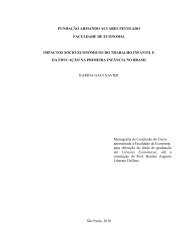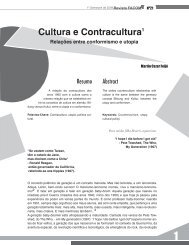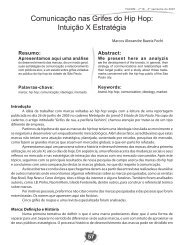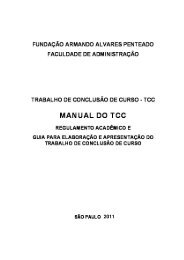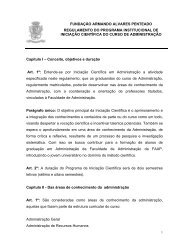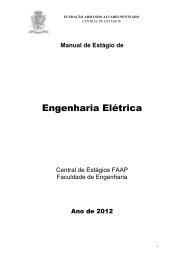Revista Estratégica vol.10 - Faap
Revista Estratégica vol.10 - Faap
Revista Estratégica vol.10 - Faap
You also want an ePaper? Increase the reach of your titles
YUMPU automatically turns print PDFs into web optimized ePapers that Google loves.
Innovation applied to the recovery of<br />
degraded areas by clay extraction through<br />
the installation of fish culture activity in the<br />
region of the sub basin of the upper region<br />
of the Machado River, Rondônia, Brazil<br />
Marcelo Rodrigues dos Anjos *<br />
Francisco Alves de Andrade **<br />
Pamela Monalisa Rodrigues Monte ***<br />
Abstract: The ceramics industry is one of<br />
the main impacting activities regarding the<br />
conservation and watershed management<br />
with the extraction of clay, the raw material<br />
for manufactured goods such as tiles,<br />
bricks, hollow elements among others.<br />
The Pimenta Bueno region located in the<br />
southern cone of Rondônia state is characterized<br />
by a geology named intercalated<br />
shale of the Cacoal Formation, displaying<br />
layered deposits related to this activity. The<br />
existing environmental liabilities, although<br />
being the responsibility of mining companies,<br />
causes conflicts with environmental<br />
managers, generating pressures from society<br />
to restore and establish the compatibility<br />
of the mineral extraction activity and<br />
the environment. Generally, pits originated<br />
from clay extraction are abandoned and<br />
end up being flooded by rainwater or<br />
groundwater, result in small ponds with<br />
depths ranging from 1.5 to 5.0 meters.<br />
The objective of this study is to determine<br />
the feasibility of fish culture as an<br />
alternative activity for the recovery of the<br />
degraded areas in intensive system, as<br />
well as an alternative for income generation,<br />
food safety, in addition to the reuse<br />
of areas previously left as environmental<br />
liabilities. It was used as method the descriptive<br />
research with periodic observation<br />
visits, interviews with questionnaires<br />
prepared with managers and officials of<br />
the studied ceramics industry. As a result<br />
it was observed that the fish culture consists<br />
of an alternative that allows areas to<br />
mitigate environmental liabilities generated<br />
by the extraction of clay. And yet, it<br />
offers a competitive advantage for companies<br />
in this sector since it becomes a<br />
profitable alternative.<br />
Keywords: Technology. Recovery of degraded<br />
areas. Mining activity. Pisciculture.<br />
* Fundação Universidade Federal do Amazonas. Rua 29 de agosto, 786 - CEP: 69.800-000 - Humaitá (AM). Instituto<br />
de Educação Agricultura e Ambiente/Humaitá – Amazonas – Brasil. Phone +55 (97) 3373-1180. E-mail: anjos@<br />
ufam.edu.br.<br />
** Faculdade de Pimenta Bueno. Av. Castelo Branco, 780 - CEP: 76.970-000 - Pimenta Bueno (RO) - Brasil. Phone<br />
+55 (69) 3451-4100.<br />
*** Fundação Universidade Federal de Rondônia – Campus - BR 364, Km 9,5 CEP 76.808-695 - Porto Velho (RO) -<br />
Brasil Phone. +55 (69) 2182-2100.<br />
Innovation applied to the recovery of degraded areas..., Marcelo R. dos Anjos, Francisco A. de Andrade e Pamela M. R. Monte, p. 23-36<br />
23



